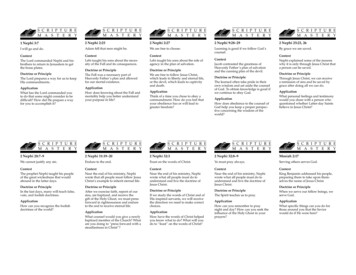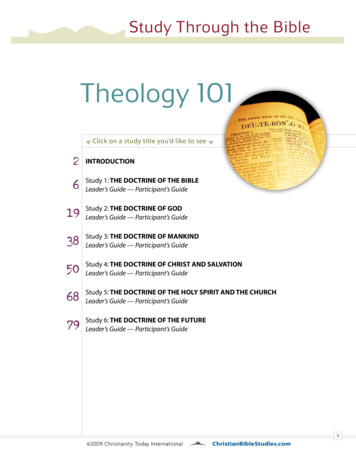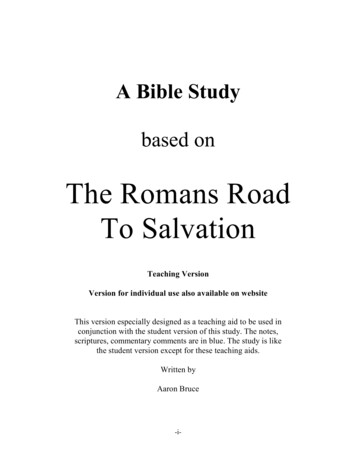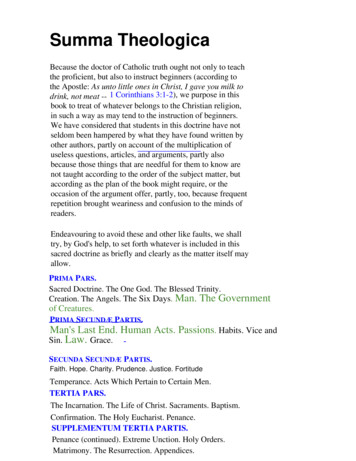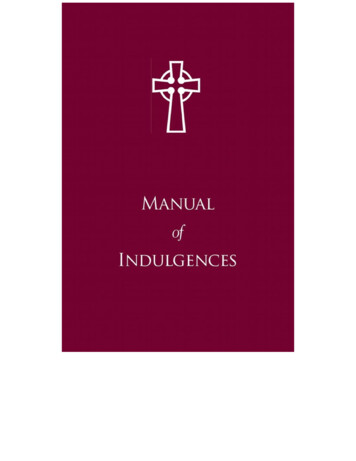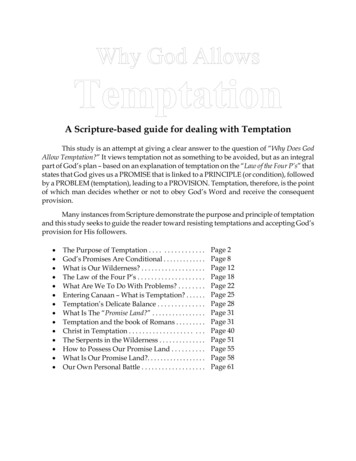
Transcription
A Scripture-based guide for dealing with TemptationThis study is an attempt at giving a clear answer to the question of “Why Does GodAllow Temptation?” It views temptation not as something to be avoided, but as an integralpart of God’s plan – based on an explanation of temptation on the “Law of the Four P’s” thatstates that God gives us a PROMISE that is linked to a PRINCIPLE (or condition), followedby a PROBLEM (temptation), leading to a PROVISION. Temptation, therefore, is the pointof which man decides whether or not to obey God’s Word and receive the consequentprovision.Many instances from Scripture demonstrate the purpose and principle of temptationand this study seeks to guide the reader toward resisting temptations and accepting God’sprovision for His followers. The Purpose of Temptation . . . . . . . . . . . . . . . .God’s Promises Are Conditional . . . . . . . . . . . . .What is Our Wilderness? . . . . . . . . . . . . . . . . . . .The Law of the Four P’s . . . . . . . . . . . . . . . . . . . .What Are We To Do With Problems? . . . . . . . .Entering Canaan – What is Temptation? . . . . . .Temptation’s Delicate Balance . . . . . . . . . . . . . .What Is The “Promise Land?” . . . . . . . . . . . . . . . .Temptation and the book of Romans . . . . . . . . .Christ in Temptation . . . . . . . . . . . . . . . . . . . . . .The Serpents in the Wilderness . . . . . . . . . . . . . .How to Possess Our Promise Land . . . . . . . . . .What Is Our Promise Land?. . . . . . . . . . . . . . . . . .Our Own Personal Battle . . . . . . . . . . . . . . . . . . .Page 2Page 8Page 12Page 18Page 22Page 25Page 28Page 31Page 31Page 40Page 51Page 55Page 58Page 61
Why God Allows Temptation?2What is the purpose of temptation?The Old Testament Prophet Hosea, speaking for God, cried out, “My people perishfor lack of knowledge” (Hosea 4:6). This concept penetrates the need of God’s people ofevery generation. The believer must be instructed in God’s ways; he must come tounderstand that God works on given principles.This study is designed to examine God’s ways and learn His principles ofoperation. It is not a theological discourse on what happened in the Garden of Eden, buthopefully, it will become an instruction manual for understanding temptations.Learning these skills can help us understand Bible truths and being us into God’sabundant living for the believer.Our life can be changed! The provisions promised in God’s Word in every realmcan be claimed. But they will not come without an element of struggle and temptation,and that is the reason this study has come into being.Many, like Israel, has left the land Egypt (symbolic of the sinner’s life); they havebeen converted to Jesus Christ, yet, symbolically, they are wondering in the wilderness,yearning for the Promise Land – “the land flowing with milk and honey” – symbolic of thepromises of plenty given in God’s Word.My prayer is that these lessons will bring you step-by-step into your ownPromised Land of victory, living a life of triumph over all temptations.We begin by realizing that God views every temptation as serving an essentialpurpose in our life. We will see that temptation shows us what we are and where westand; and it play an important role in what we will be in the future! Temptation is afactor in the psychological and spiritual growth process everyone must go through ifwe are to become mature individuals, capable of living a full and meaningful life.The function of temptation is always to trigger a choice and provoke a definitestand or action. Temptation forces us to make a difficult and important decision. – If wedisobey what we know to be the right thing to do and commit an act of disobedience, itbecomes easier psychologically to repeat the same choices in the future, however, doingthe right thing establishes a pattern for mature and wise decisions in the future.Temptation is the dividing line between innocence and awareness. Once we facetemptation and made a choice of action, we have stepped into a new dimension ofreality. If our choice is right – we are blessed. If our choice is wrong – we harm ourChristian walk.
Why God Allows Temptation?3Temptations will come into our experience whether we like it or not. Theyalways present a lesson to be learned. Our choice demonstrates whether the lesson islearned or if it must be repeated.We say to our children, “Don’t cross the busy street alone!” Temptation comes intoplay the moment the child is given an opportunity to disobey. There is no one around tosee, and the other side of the street beckons, promising adventure. The response totemptation will determine if the child can be trusted to play alone near the street in thefuture.How we face temptation affects every area of our personal experience. For us tounderstand more about the nature of temptation and its definite purpose is of vitalimportance.Unfortunately, temptation is one of the most misunderstood words in ourlanguage. It is thought of as something to be avoided at all cost – something dangerousthat will cause much pain or trouble – or something that will surely lead us intowrongdoing.Temptation may lead to these things, but only if we make the definite choice inthat direction. Temptation is not the cause of trouble or wrongdoing. It just presents uswith a choice. To blame my wrongdoing on temptation - (such as saying, “I wouldn’thave done it if I hadn’t been tempted!”) – is as ridiculous as saying, “I wouldn’t have gotten atraffic ticket if the light hadn’t changed to red just before I got to the intersection.”Who was to blame for the ticket – you or the red light? The light only served topresent you with a quick choice: Should I stop and obey the law? Or hurry through tosave time – and make myself liable to face the consequences? The decision is entirelyours.Understanding how temptation functions will help us face it differently – andcan change our lives. When we Christians are honest with ourselves, we are forced toadmit that there is a noticeable discrepancy between the Christian life that we read of inGod’s Word and what we experience in our daily living – (what we – down deep in ourhearts – hope it would be). I use the word ”hope,” because it seems that some believersaren’t even sure that the Christian life, as taught in the Bible, can be a reality in today’sworld.Some explain the discrepancy between the beautiful promises in the Bible andthe lives of many Christians by saying that these promises of Christ-like living mustrefer to heaven. This is “pie-in-the-sky” religion, and it doesn’t do much to help us solveour problems here and now. Paul refused this kind of escapism when he emphasizedthe now aspect of the Christian life in Romans 5:17:“The sin of this one man, Adam, cause death to be king over all,but all who will take God’s gift of forgiveness and acquittal are kingsof life because of this one man, Jesus Christ.”
Why God Allows Temptation?4Real Christianity is when Bible promises become reality. This is how God meantit to be. Realizing the abundance of God’s promises – without experiencing theirfulfillment – should bring us to a place where we refuse to seek another Biblicalpromises until the ones we already know become functional in our life.Knowing all the promises in the Bible by memory doesn’t make the provisionsautomatically ours. There are believes who go around quoting, “There is now nocondemnation awaiting those who belong to Christ Jesus” (Romans 8:1). Yet, they live underconstant condemnation, as if they must carry the guilt of their old sins with them to thegrave. There are those who quote Scriptures about having joy in their hearts – and theyare the most joyless creatures you could ever meet. And others know all the Scriptureson how we should love each other – however, they live in marriages that are on theverge of breakup, are unable to communicate love to their own children, and havecontinual difficulties in business relationships.Can God . . .heal the brokenheartedeffect recovery to the sickbring love to the lonely and bittersave the lostset free those who are in miseryrepair broken relationships?Can He bring love, joy, and laughter into gray empty lives – make families one inlove and spirit?Can He meet our particular need – answer our particular prayer – fulfill theparticular promise that we have cherished for years?Can He – or can’t He? Is the Bible true or is it a bunch of fairy tales – justsomething to comfort us in this world of problems? Is religion a crutch for the weakwho cannot face reality?I believe that the Bible is true – every word of it; and I have seen enough of thosepromises turned into real provision over the years to know – without the least doubt –that behind the words of the Bible stands our all-powerful and loving Father, who notonly can make His words good, but wants to see this happen!So, why can’t we overcome these temptations; why aren’t we all experiencing thepromises of God turned into actual provisions? Since the promises are real enough,there must be something else wrong? We have to admit there is “something else” wrong.In our search for the culprit, we are usually required to turn the searchlight onourselves. It doesn’t necessarily mean that we need to pray more, give more time toBible study, go to more prayer meetings, try harder to “be good,” or give more money tomissions. All of these things are profitable, but they aren’t at the heart of this particularproblem that needs to be solved.
Why God Allows Temptation?5Between us and the fulfillment of God’s wonderful promises always lies asituation containing temptation – and it is how we respond to temptation thatdetermines whether or not we receive the fulfillment of our promises.ThePromisesof GodHow to getfrom hereFulfillment ofGod’s Promises– or Provisionto here?In other words, when we learn how to face temptation, we will have learned howto see the promise become reality – our personal possession and fulfillment!Before we go on, we should have a very clear understanding of what temptationis not. We wouldn’t want to create another misunderstanding by implying that thereason we don’t receive God’s provision is because we are repeatedly indulging insinful acts – like stealing, lying, adultery, etc. We can certainly be tempted to do some ofthese things, and if we choose that sort of life, this would be part of the reason why weare left standing with an empty promise instead of a fulfilled provision. But temptationis more than the comic-book caricature of a sexy woman, luring her pray into someadulterous act.The Greek word that has been translated as “temptation,” in the Bible means,“that which puts to the proof” – whether by good or malicious design. Temptation isdesigned to bring out what is really in our hearts. Temptation, in itself, is not good orevil; it simply puts to the proof and test. It reveals what we really are!For example, steel must be tempered by heat and put to the test under varyingdegrees of stress to see how it will react for its intended use. Temptation puts to the testhow we will react in a situation related to the promise God has given us. If we reactaccording to Biblical specifications, the provision will be ours. This does not mean thatGod’s promises are earned or deserved – God’s gifts are always free, because of God’sgrace to mankind. The question is whether or not we have the capacity to receive what Godhas promised?Untempered steel, given too much pressure, will break. Fulfillment of a promise,without preparation, can break us as well! We must come to realize that there is areason for temptation? Its purpose is not to make life hard or difficult, but rather toassist in the preparation needed to receive the good things God desires to give to us.Seen in this perspective, temptation isn’t something frightening or to be avoided– rather, it is a necessary part of our Christian life – something we should understand
Why God Allows Temptation?6and face eagerly and joyfully (James 1:2). After all, temptation is designed to prepare usto receive what we long to have!The Bible is our textbook. We will find as we search its pages that the purposeand principle of temptation is clearly revealed and demonstrated here – beginning withthe Old Testament and carrying on through the New Testament. A series of test caseswill show how temptation provided the turning point that determined the success orfailure of experiencing fulfilled promises.The Christian life can never be defined in simple methods!. I am not suggestingthat we can discover some easy step-by-step formula for how to face temptation andthus receive the fulfillment of God’s promises. However, we will discover that Godalways operates according to clearly defined principles. When we understand theseprinciples and learn to apply them in our life, we can move on and grow up into thefullness of life the Bible presents.Right now – before we go any further – why not ask God to open your ownunderstanding to this exciting possibility, and say with me.“Lord, teach me Thy ways!”Jesus prayed, just before going to the cross, “I pray not that Thou, [Father] shouldtake them out of the world, but that Thou should keep them from the evil. They are not of theworld, even as I am not of the world, Sanctify them through Thy truth” [John 17:15-17].God has a divine purpose for the believer between the time of his conversion toJesus Christ and the end of his life on earth.Paul ends his marvelous letter to the Romans by saying, “Now to Him [JesusChrist] that is of power to establish you according to my gospel, and thepreaching of Jesus Christ, according to the revelation of the mystery, [of thekingdom of God] which was kept secret since the world began. But NOW mademanifest, and by THE SCRIPTURES OF THE PROPHETS, according to thecommandments of the everlasting God, made known to all nations for theobedience of faith" (Romans 16:25-26).Other translations, perhaps, makes this concept easier to comprehend:“Now to Him who is able to set you on your feet as His own sons – according to mygospel, according to the preaching of Jesus Christ Himself, and in accordance withthe disclosing of that secret purpose which, after long ages of silence, has now beenmade known (in full agreement with the writings of the prophets long ago), bythe command of the everlasting God to all the gentiles, that they might turn to Himin the obedience of faith – to Him, I say, the only God who is wise, be glory for everthrough Jesus Christ, amen!” – [J. B. Phillips]
Why God Allows Temptation?7“To Him who is able to make you strong, according to the gospel I preach, and theproclamation concerning Jesus Christ, in harmony with the unveiling of themystery shrouded in silence in past ages, but now brought to light and by thecommand of the eternal God made known through the writings of the Prophetsamong all the Gentiles to win them to obedience to the faith – to God, the only wise,through Jesus Christ, even to Him be the glory through all the ages! Amen.”[The New Testament in Modern Speech – by Weymouth]What "Scriptures of the prophets" does Paul refer to?One of the most interesting and informative verses in all the Bible is 1 Corinthians 10:6 that states, “Now these things were our examples to the intent we should not lustafter evil things as they also lusted” – verses 7 through 10 lists Israel’s sin, then, verse 11continues, “Now all these things happened unto them for examples; are they are written for ouradmonition, upon whom the ends of the world are come.” – This passage, of course, isreferring to the children of Israel and God’s dealings with them throughout the OldTestament. All these things of God’s dealing with Israel given in the Old Testamenthappened for our benefit. God’s dealings with Israel, that we read about in the wholeOld Testament, was to give us lessons on how we, as believers, are to live for God. Theexperiences we will face and temptations that will come into our life are pictured inGod’s dealings with Israel. As we read of their trials and the promises God gave tothem, we realize that it was all for us today in this Church Age to encourage and inspireus in our walk with God.As we look into the Old Testament, we see that Israel was enslaved in Egypt,under the cruel whip of taskmasters; however, God delivered them from this miserablebondage. They were "redeemed" out of Egypt, as they obeyed God’s command to applythe blood of a sacrificed lamb to the doorpost of their homes.This is clearly a "figure" of our salvation from thebondage of sin by the blood of Jesus Christ, our Lord.However, this was only the beginning of Israel's journey. God wanted them notonly out of Egypt, but to enter into the land of Canaan. Between Egypt and the land ofCanaan lay a wilderness!(1) SALVATION FROM SINAfter the blood was applied, Israel left Egypt's bondage.(2) BAPTISM IN WATERIsrael's first experience was entering and coming up out of the Red Sea.(3) THE PRESENCE OF THE HOLY SPIRITThe next observation in the life of Israel was God's provision of thesupernatural cloud and pillar of fire, leading, guiding and directing thechildren of Israel
Why God Allows Temptation?8(4) GOD'S PROMISE AND COMMANDMENTBeginning in Exodus 19, God reveals His will for the children of Israel.This is the Scripture, no doubt, which Paul is referring to in Romans16:26, when He says, "The Scriptures of the prophets."Exactly what does Exodus 19 teach?Exodus 19:5-6, "Now if you obey Me fully and keep My covenant, then out of all nationsyou will be My treasured possession. Although the whole earth is Mine, you will be for Me akingdom of priests and a holy nation.' These are the words you are to speak to the Israelites."The point is, before God’s people could posses the promises God had given tothem, there were conditions that they had to fulfill.God’s Promises Are ConditionalBetween each of us and the fulfillment of God’s promises stands a situation thatincludes temptation. Let’s take a closer look at some of the basic promises God offers allwho come to Him and see at what point – in relation to the promise – temptation entersthe picture.What could be sadder than Christians who have resigned themselves to theerroneous idea that God either cannot – or will not – pour out His blessings on ustoday? To hear some talk, you would think that God is tight-fisted, dribbling out justenough blessings to bearly keep us going in this present world.However, Scripture pictures God as eager and anxious to give good thingswithout preference or partiality. While the Bible is often referred to as a Book ofPromises, it is just as much a textbook on, “How to Turn Promises Into Provisions.” Nopromise in the entire Bible is an empty promise. Luke 1:37 tells us, “For with God nothingis ever impossible, and no word from God shall be without power or impossible of fulfillment”(Amplified Bible).Our first “test case” is the Israelites –- God’s chosen people. He brought them outof Egyptian slavery in order to bring them into a land flowing with milk and honey. Hispromise was, “you will become a great nation in a glorious land flowing with milk and honey’even as the God of your fathers promised you God will give you great cities full of good things– cities you didn’t build, wells you didn’t dig, and vineyards and olive trees you didn’t plant”(Deuteronomy 6:3, 10-11).Keep in mind, that although we are speaking of a specific people in a certainplace and time in history – the same promises are applicable to us today – as God’sspiritual children. God desires to bring us out of whatever bondage we may be in -psychological, spiritual, or physical –- in order to bring us into “a land flowing with milkand honey.” This is a picture of the abundance of good things (both spiritual and
Why Temptations?9physical) that God has for us in this life.It sounds almost too good to be true doesn’t it? God wants to give us everythingwe could possibly need – things for which we are not required to labor! Moses goes onto say to the Israelites, “God will drive your enemies out before you” (verse 19).In plain, everyday language, this means that God desires to lead us into asituation – spiritual and physical – where He will provide for our every need – job,home, friends, clothes, food, peace of mind – everything our hearts may desire. To getall of this we do not have to work for it – earn it – or deserve it.If it is all that simple, what kept the Israelites from claiming these promises fromGod? How is this similar – illustrative – of our Christian walk today? Doesn’t the NewTestament tell us that God gave His only begotten Son, Jesus Christ, as a free gift – andthat by accepting Him as our Savior we no longer have to pay for our own sins – whichis the death penalty? God tells us that, instead of a death penalty, we are told we canreceive the gift of God’s grace, His parson, and eternal life in Christ.This brings us to what is probably one of the most debated aspects of theChristian life: legalism versus “everything by grace.” There are groups of believers oneach side of the fence – those who lean to the legalistic by overemphasizing the beliefthat we must observe certain rules and regulations in order to be in right standing withGod – and those who say that under the New Covenant (the covenant sealed by JesusChrist on the cross), we cannot earn God’s gifts by keeping rules and regulations. Allthings are free in Christ.What are we to do? Are we to choose up sides and come out fighting? Godforbid! Neither extreme position is correct. Yet both have caught some aspect of thetruth and carried it too far. Error can come by over-emphasis or neglect. God doesn’twant legalism but neither does He want disobedience! In reality, everything God hasfor us is a gift. We cannot earn anything by our own goodness or efforts; however,God’s gifts can only be received on certain conditions.Just in case this sounds like double-talk to you, we shall look at some promises inthe New Testament.Jesus said, “If you stay in Me and obey My commands, you may ask any request youlike, and it will be granted” (John15:7). This is Jesus Himself speaking, and He is giving aremarkable promise. But notice the “if” – there is a condition to the promise. In fact, Idon’t know of a single promise in the Bible that does not have a condition attached to it.Consider the promise of salvation: “God loved the world so much that He gave Hisonly Son so that anyone who believes in Him shall not perish but have eternal life” (John 3:16).Some people in this world are perishing because they haven’t met the condition forsalvation, which is offered as a free gift – but, only to those who choose to believe. The
Why Temptations?10Amplified Bible explains the term “believing” as, “anyone who trusts, clings to, relies onJesus Christ.” We are talking about more than lip service here; rather it is a matter of atotal personal trust and reliance on Christ in every aspect of life. That is the condition.The condition always describes how a promise is to be fulfilled. Only under theseprescribed conditions can the promise become reality. Taking another promise of Jesus,we note: “I am the Vine, you are branches. Whoever lives in Me and I in him shall produce alarge crop of fruit” (John 15:5). The promise is that we shall produce a large crop of fruit,provided we live in Him and allow Him to live in us. Jesus goes on to explain why thisis so. “For apart from Me you can’t do a thing. If anyone separates from Me, he is thrown awaylike a useless branch, withers and is gathered into a pile with all the others and burned” (John15:5b-6) The reason the condition is necessary is a very simple one – apart from JesusChrist we cannot produce spiritual fruit!The reasons for putting conditions on the promises given to the Israelites werethe same: apart from God they would not be able to posses the land and enjoy the kindof life God wanted for them. Can you see that giving the condition, “If you are willingand obedient ” before the promise ”you will eat of the good of the land ” was due to thefact that God knew if they tried to do it in their own way, they would fail miserably inthe end? Their obedience to God was designed to reduce their dependency on their ownresources and strength, and increase their dependency on God.God is not a tyrant who wants us all to cower in obedience before Him; but it isbecause He loves us and knows our natures well enough to see that – left to our owndevices – we always make a mess of things. When Jesus said, “On your own, apart fromMe, you can do nothing” (John 15:5), He meant that apart from Him we cannot doanything truly worthwhile and lasting. We just cannot produce the kind of fruits He canproduce in us and through us when we stay close to Him and depend on Him. We needto give up our self-sufficiency so that we can come to a place in our Christian experiencewhere we cease from our own frantic labor and let Jesus Christ do the work.Another truth that Jesus tried to impress on His followers was that if they believein Him, they would one day do greater works than He was doing. One day the disciplesasked Jesus, “What are we to do that we may (habitually) be working the works of God? –What are we to do to carry out what God requires?” Jesus replied, “This is the work (service)that God asks of you, that you believe in the One Whom He has sent – that you cleave to, trust,rely on and have faith in His Messenger” (John 6:28-29 Amplified Bible). Jesus said to them– and is saying to us today – that when we stop trying to do things in our own strengthand recognize our own insufficiency, only then we can let Him work through us.As Christians, we know in our hearts that what we do in our own strength “forthe Lord” amounts to zero. Oh, we may busy ourselves in various church activities, evenresponsibilities of carrying out the ministry, but we, in our self, cannot save anyone. Wecannot heal anybody. We cannot comfort the brokenhearted, give sight to the blind, orset anybody free from the prison of their guilt. It is only when we come to a position of
Why Temptations?11total reliance on Jesus – total trust, obedience and rest from our own labors – that wewill see Jesus being salvation to others through us; see Him heal and comfort others andset them free through us. Always it is His doing through our willingness and obedienceto His command.This is the only way we can ever enter our Promised Land. Because the PromiseLand is a place of rest, frantic self-efforts do not belong there. Hebrews describes God’spromises about a place of rest and how we may enter:“1, Although God's promise still stands--His promise that all may enter His placeof rest--we ought to tremble with fear because some of you may be on the verge offailing to get there after all. 2, For this wonderful news--the message that Godwants to save us--has been given to us just as it was to those who lived in the timeof Moses. But it didn't do them any good because they didn't believe it. Theydidn't mix it with faith. 3, For only we who believe God can enter into His placeof rest. He has said, I have sworn in My anger that those who don't believe Mewill never get in,’ even though He has been ready and waiting for them since theworld began. 4, We know He is ready and waiting because it is written that Godrested on the seventh day of creation, having finished all that He had planned tomake. 5, Even so they didn't get in, for God finally said, They shall never enterMy rest.’ 6, Yet the promise remains and some get in--but not those who had thefirst chance, for they disobeyed God and failed to enter. 7, But He has set anothertime for coming in, and that time is now. He announced this through King Davidlong years after man's first failure to enter, saying in the words already quoted, Today when you hear Him calling, do not harden your hearts against Him.’ 8,This new place of rest he is talking about does not mean the land of Israel thatJoshua led them into. If that were what God meant, he would not have spoken longafterwards about today’ being the time to get in. 9, So there is a full complete reststill waiting for the people of God. 10, Christ has already entered there. He isresting from His work, just as God did after the creation. 11, Let us do our best togo into that place of rest, too, being careful not to disobey God as the children ofIsrael did, thus failing to get in” (Hebrews 4:1-11 Living Bible).Some people seem to think that this place of rest is where we enter after ourphysical death, but that is not what Scripture teaches. It is not consistent with theteachings of Jesus. He said – over and over again – that in our Christian walk in this life,we are to cease from our own labors now, letting Him work through us. Our PromisedLand today is a place of rest where we will dwell in cities we didn’t build and receivedgood things for which we did not work – because God alone will do the work for us andthrough us! It is physically and spiritually impossible for God to do this until wesurrender our attempt to do it for ourselves.The condition God gives us is that we must be willing to give up our own waysand work, and be obedient to His every command as He lives in and works through us.God’s promises must be seen in relation to their conditions.
Why Temptations?12It is in the midst of our reaction to the conditions that temptation enters thepicture. Temptation relates to the promises through the condition. When a promise isgiven with a condition. God is saying, “I will do this if you will do that.” Temptation thenpresents us with the choice either (1) to fulfill God’s condition, or, (2) to ignore it. If wefulfill the condition, we can enter into the provision – the Promised Land. If we ignorethe condition, we will not be able to receive fulfillment of the promise.Returning to Hebrews, we read:“ But,’ God says, I was very angry with them, for their hearts werealways looking somewhere else
Real Christianity is when Bible promises become reality. This is how God meant it to be. Realizing the abundance of God’s promises – without experiencing their fulfillment – should bring us to a place where we refuse to seek another Biblical promises until the ones we already know become functional in o
